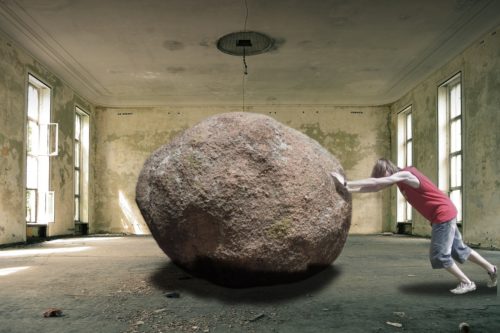About ten years ago, Alain de Botton wrote a book called The Pleasures and Sorrows of Work. It’s a perfectly fine book, not a great book. From the great tradition of writing about working, I far prefer the live interviews of Studs Terkel. And so, I’d greatly recommend his book Working.
But there’s something I do find admirable about de Botton’s The Pleasures and Sorrows of Work. Especially insofar as it says something about working in a corporate office.
A Quote from The Pleasures and Sorrows of Work
I’ll get straight to the point. Here’s a description de Botton gives of the corporate office experience:
“The employees proceed upstairs without looking around them. To feel at home in the office is not to notice the strange silver sculpture in the lobby and to forget how alien the place felt on the first day. The start of work means the end to freedom, but also to doubt, intensity and wayward desires…How satisfying it is to be held in check by the assumptions of colleagues, instead of being forced to contemplate, in the loneliness of the early hours, all that one might have been and now never will be…Life is no longer mysterious, sad, haunting, touching, confusing or melancholy; it is a practical stage for clear-eyed action.”
I can’t fully endorse this, just as I can’t fully endorse The Pleasures and Sorrows of Work. At times it’s an insightful examination of office work, And at other times it’s an exercise in condescension. But let’s roll with it a bit.
The ‘Mundane’
As I said, there’s a lot here from the mundane to the profound. Let’s start with the former.
When you work in an office for years, these features really do recede to the background. You walk past the art and the décor. You walk past the offices and the people. They’re not even folderol, so much as they’re a part of the environment in which one copes. They’re a part of what happens here, in the sense Hubert Dreyfus might describe it.
And the place does feel alien on the first day. If I think about it, I remember my workplace from the interview or my first day. You lose that memory after awhile, but it’s still bouncing around somewhere.
The ‘Profound’
And then there’s the other stuff. OK, so work does end freedom in a meaningful sense. Any decent Marxist knows the employer pays for your labor-power. But the employer also pays for your time and your body. This isn’t always a taxing experience, especially in some office work. It is, though, a meaningful limit to your freedom in all but the most democratic of workplaces.
I think Alain de Botton is also right that it means the end of ‘doubt, intensity, and wayward desires’ and that the end of these things is meaningfully tied to a loss of freedom. To work in an office is often to work on a set schedule, even in salaried, white-collar jobs. One simply goes to the office in the morning in much the way one goes to school as a child. The experience is one of having one’s day planned already, relieving one of both a burden and a set of possibilities.
Loving What You Do?
Maybe the bit about intensity and desires says more about the corporate office than the world of work in general. After all, you don’t have to lose your intensity. Don’t some people – chefs? teachers? social workers? – do what they love?
And not just people doing good in the world, but also everyone. At least according to the business literature. There, the experts pound into your head the idea you aren’t supposed to lose your intensity. Rather, you’re supposed to love your work.
Not that they say, directly, you’re supposed to love your work. They don’t. They say you’re supposed to work at what you love. Obviously most people don’t do that, even in some of those professions I listed above. As a result, the business advice really amounts to the Stephen Stills Theory.
I think that’s the underlying truth.
